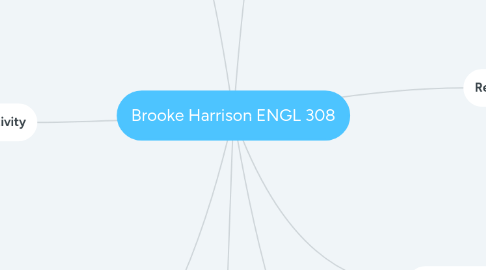
1. Engagement
1.1. Peer Reviews
1.1.1. DD6HW1: Peer Review P#1 Formal Research Report
1.1.2. DD6HW5: Evaluate Presentations
1.1.3. DD11HW1T2: Peer Review Technical Instructions
1.1.3.1. Engagement means showing a sense of investment and involvement in learning. By conducting peer reviews, I engaged with my classmates by showing my involvement not only with the overall course, but with my fellow classmates as well, in order to positively impact their projects.
1.2. DD12HW1: Map Your Learning in ENGL308
1.2.1. In completing this assignment, I am engaging with my past course material to show a sense of investment and involvement in my overall learning this semester
2. Creativity
2.1. Audience Analysis/Rhetorical situations
2.1.1. DD2HW2: Compare Rhetorical Situations
2.1.1.1. Creativity is the ability to use novel approaches for generating, investigating, and representing ideas. With all of my audience analyses and rhetorical situations, I have provided examples as to how I used unique approaches to generate ideas. I applied creativity to each project by fictionalizing scenarios to which I based both project #1 and project #2 off of.
2.1.2. DD9HW4L Draft Your Proposal for Project #2 (this included creating a rhetorical situation)
2.1.3. DDiHW2: Conduct Audience Analysis for Project #2
2.1.4. DD3HW1: Conduct Formal Research Report Audience Analysis
2.2. DD9HW3: Learn Graphic Design Application
2.2.1. Here, I learned how to use the design application Canva, which was a unique approach to creating an instruction set for project #2.
2.3. DD10HW2: Take & Edit Screenshots
2.3.1. Here, I learned how to use Google Drawing, which was a unique approach to editing graphics that I incorporated into my instruction set for project #2.
3. Persistence
3.1. DD12HW1: Map Your Learning in ENGL308
3.1.1. Persistence means the ability to sustain interest in and attention to long term and short term projects. My mapping out my learning, I am proving my attention to the overall course to be represented as a "long-term project"
3.2. Overall work completed for Project 1
3.2.1. As there was a heavily load of required work for these projects, I practiced persistence by staying on top of each due date and remained attentive and interested throughout the entirety of each.
3.3. Overall work completed for project 2
4. Flexibility
4.1. Overall collaboration in project #1
4.1.1. Flexibility means the overall ability to adapt to new situations, expectations, or demands. In all of the collaboration efforts of project #1, I practiced flexibility when adapting to my group's overall expectations and demands of the collaborative aspects.
4.2. Altered due dates/changed or deleted homeworks
4.2.1. Although the extended due dates and altered homework's were beneficial, I demonstrated flexibility by altering to new course demands. For instance, when the conducting primary research task was taken out of project #1, my group had to adapt by instead providing more secondary research as evidence/support.
5. Curiosity
5.1. DD2HW3: Secondary Research on Collaborative technology
5.1.1. Curiosity is the desire to know more about the world. With my secondary research, I practiced curiosity by thoroughly investigating the use and effect of collaborative technology in the field of electrical engineering
5.2. All of the assigned course readings
5.2.1. By completing all assigned readings, I practiced curiosity by showing my willingness and interest in learning more about technical writing.
5.3. DD8HW5: select an application & Research Existing instructions
5.3.1. By researching various applications, settling on one, and practicing with it, I showed curiosity through my willingness to learn more about various applications for project #2.
6. Metacognition
6.1. DD7HW5: Submit Final, Polished Version of P#1 Project & Collaboration Reflection
6.2. DD11HW2T4: Submit Final, Polished Version of P#2 Reflection
6.3. DD4HW4: Update & Reflect on Process/Progress
6.3.1. Metacognition is the ability to reflect on one's own thinking. During each assigned task to which I was asked to produce a reflection, I was practicing metacognition by reflecting on my own thoughts and progress along the way
7. Openness
7.1. Overall collaboration in project #1
7.1.1. My group had to collaborate on deciding certain factors of project #1 such as: industry/field to focus on, research questions, primary research questionnaire, web meeting applications, schedule, rhetorical situation, etc.
7.1.1.1. Openness means the willingness to consider new ways of being/thinking in the world. I demonstrated openness with these tasks, because it was necessary that I remain open to new ideas/ways of conducting this project that I might not have initially chosen myself.
7.2. Creating Rhetorical Situations for Project #1 and Project #2
7.2.1. By creating Rhetorical situations, I practiced openness by considering new ways of thinking. After crafting the audience, purpose, context, etc., I then created projects specific to the demands set by the rhetorical situations, and therefore practiced openness by altering my projects to fit these demands.
8. Responsibility
8.1. DD2HW5: Draft Team Charter & Task Schedule
8.1.1. Responsibility is the ability to take ownership of one's actions. With each assignment thus far, I have practiced responsibility by ensuring I meet all deadlines and produce quality work. Although here, I have specifically focused on the collaborative work of project 1
8.1.1.1. While working with a group, I practiced responsibility by understanding my obligations to meet all group standards and assignment deadlines. As a member of my group, I upheld the responsibility to do my part in order to contribute to the overall success of the group
